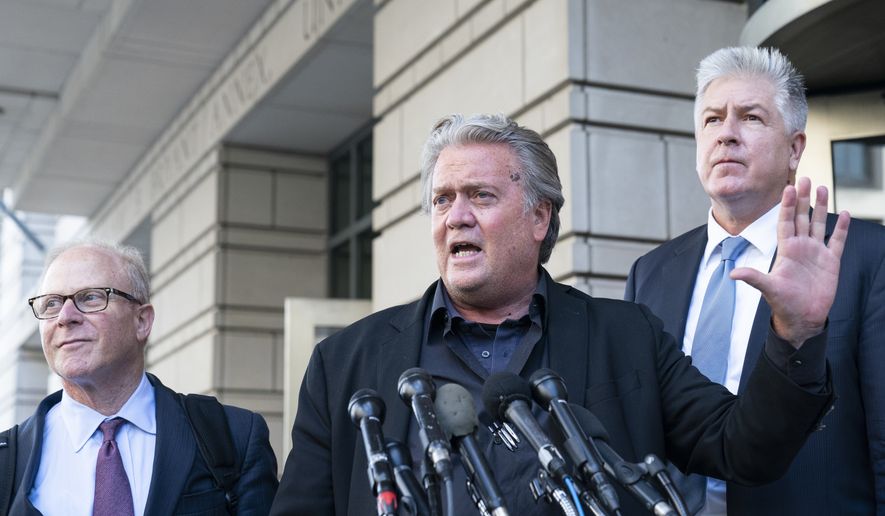The federal judge overseeing Stephen K. Bannon’s criminal contempt of Congress case warned that he would not allow the trial to devolve into a “political circus” as the trial against the former Trump adviser entered its third day on Wednesday.
Before the jury entered the courtroom to continue hearing testimony from the prosecution’s first witness, Assistant U.S. Attorney Amanda Vaughn raised concerns before U.S. District Judge Carl Nichols about what she said were attempts by Mr. Bannon’s defense team to paint the motivations of the House Jan. 6 Committee as political, which she said should be barred in arguments before the jury.
Judge Nichols ruled that Mr. Bannon’s defense team has leeway to inquire about the biases of witnesses in the courtroom, but may not ask about biases of those outside of the courtroom.
“There may be some questions that cross the line,” the judge said before assuring the prosecution that he would police the questioning of witnesses.
“I don’t intend for this to become a political case or a political circus,” Judge Nichols said.
Mr. Bannon, 68, is on trial for criminal contempt of Congress after defying the Jan. 6 committee’s demands for documents and deposition in its probe of the Jan. 6, 2021, riot at the Capitol.
SEE ALSO: Key government witness against Bannon joined Democratic book club with prosecutor
He has pleaded not guilty to two counts of contempt of Congress. He could spend up to two years behind bars if convicted on both counts.
Mr. Bannon, who hosts the news and opinion broadcast “War Room: Pandemic,” insists the charges against him are politically motivated.
On Tuesday, Mr. Bannon’s legal team moved in its opening statements to paint the Democratic-controlled committee as a partisan weapon being used to target political opponents.
“Politics is the lifeblood of the House of Representatives,” Mr. Bannon’s lawyer Evan Corcoran said. “Politics affects every decision. It’s the currency of Congress.”
Ms. Vaughn argued Wednesday that the jury should not “hear one more word” about the political motivations behind the committee or the subpoena.
The prosecution then continued laying out what it says is a straightforward case of Mr. Bannon refusing to comply with demands to turn over documents and testimony after receiving a subpoena from the committee last fall.
SEE ALSO: Secret Service yet to uncover missing Jan. 6 texts for House probe
Kristin Amerling, the Jan. 6 committee’s deputy staff director and chief counsel, who was called as the first witness on Tuesday, continued her testimony Wednesday and focused primarily on her role in advising on the subpoena issued to Mr. Bannon last fall.
She testified that Mr. Bannon failed to communicate his objections to complying with the committee’s demands to hand over documents and testimony before the first Oct. 8, 2021 deadline.
Her testimony also focused on correspondence between the committee and Mr. Bannon’s counsel at the time, Robert Costello.
Mr. Costello outlined his client’s objections to complying with the subpoena based on his view that his participation in the probe was protected under former President Donald Trump’s claims of executive privilege, which was at the time the subject of an ongoing court battle.
Those claims were rejected by the committee, and Ms. Amerling told the jury that the committee warned Mr. Bannon on multiple occasions that he would be held in contempt if he continued to fail to comply with the subpoena.
The defense began its cross-examination of Ms. Amerling later Wednesday focusing on Ms. Amerling’s role in drafting the subpoena and associated correspondence.
The defense also focused on a proof of service for the subpoena which Ms. Amerling signed when she emailed the subpoena to Mr. Costello last September.
Mr. Corcoran pointed to an 8-page transcript of Ms. Amerling’s testimony to the FBI and asked whether Ms. Amerling testified during the interview that she signed the proof of service before it was served.
Ms. Amerling replied that she did not recall discussing the matter specifically with the FBI.
The defense will continue its cross-examination after returning from afternoon recess on Wednesday.
• Joseph Clark can be reached at jclark@washingtontimes.com.




Please read our comment policy before commenting.